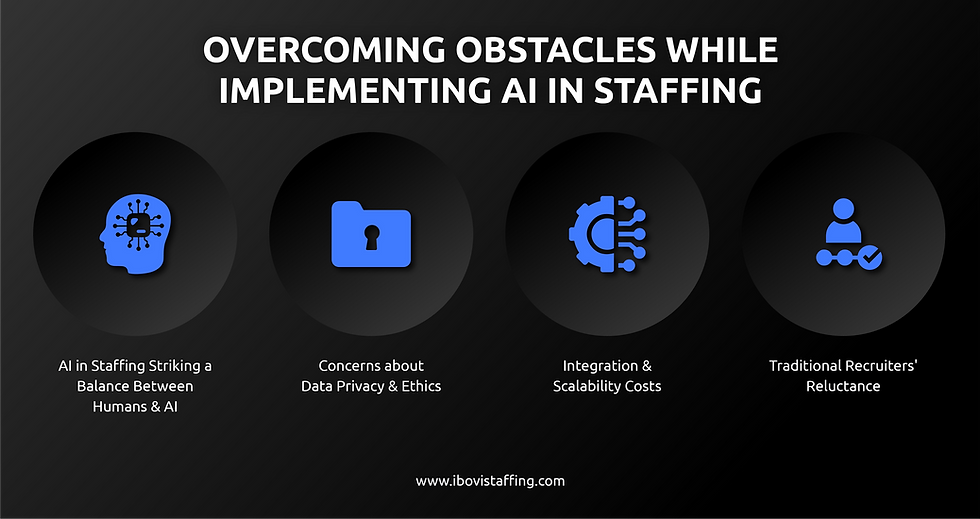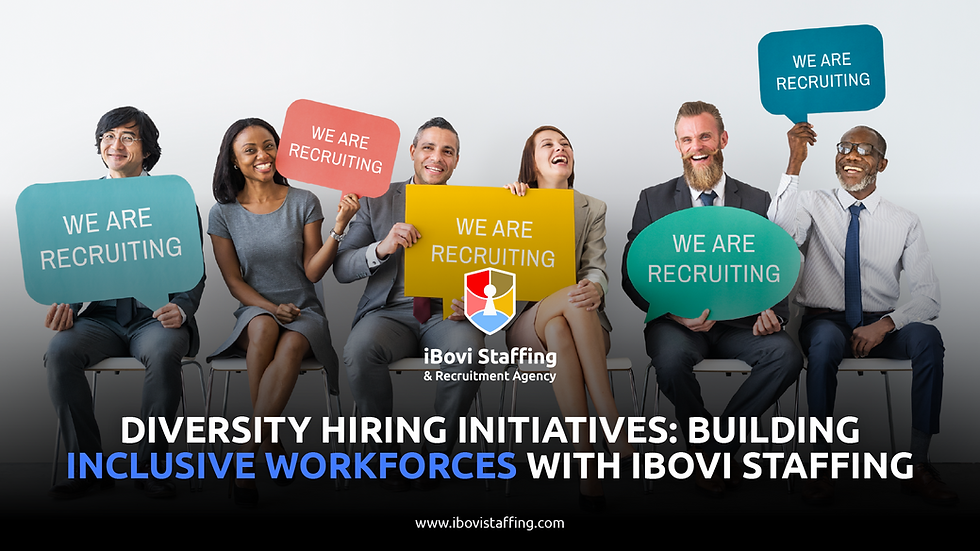Staffing Gets Smarter with AI in Staffing
- sakshig3
- Jul 17, 2025
- 6 min read

Table of Contents
AI Revolution in Staffing: Smart Hiring Trends
Assume the role of a recruiter who has 1,000 resumes to review by the end of the day. Before you even taste your coffee, an AI tool has already screened, sorted, and ranked them for you. You open your dashboard, take a sip, and you have a list of applicants ready in no time. It is AI in staffing today.
AI isn't simply a tool in a talent market where speed, accuracy, and personalization are crucial; savvy businesses like iBovi Staffing rely on it as a strategic partner to discover the right individuals more quickly and efficiently than ever before.
Let's examine how AI in recruitment and selection is changing the workforce, where it is most useful, and how progressive companies are using it to maintain their lead.
Check Out: AI in Recruitment Process
Human-Machine Interaction: How AI Enhances Hiring Precision?
Fundamentally, AI improves human strengths like empathy, judgment, and negotiation by automating tasks that humans shouldn't have to perform by hand. Here are some ways AI in staffing is redefining essential hiring tasks:
Precision Candidate Matching
AI-powered smart screening technologies look beyond keywords on resumes to find relevant skills, accomplishments, and certifications. They lessen unconscious bias and oversight by ranking applicants according to their probable fit.
Predictive Hiring Models
The past recruiting data and job descriptions are no longer used now. Machine learning algorithms forecast which applicants have the best chance of succeeding in a position.
Improved Screening of Resumes
AI can comprehend resume context through natural language analysis, even if keywords are buried in paragraphs or are written differently. About iBovi Staffing, we utilize cutting-edge AI capabilities to identify high-potential applicants that conventional keyword-based screening might miss.
Candidate Communication Around-the-Clock
Chatbots ensure a smooth candidate experience by answering questions, scheduling interviews, and updating application progress around the clock.
Automation of Marketing and Recruitment
AI assists in tailoring job postings and directing them to job boards where qualified applicants are most engaged.
Where Does AI in Staffing Work Best?
AI isn't universally applicable. The impact varies according to candidate expectations, job intricacy, and hiring volume. Here is a thorough explanation of it:
Hiring Scenarios | Challenge | AI-Driven Solutions |
High-Volume Hiring | Recruiters cannot swiftly evaluate thousands of applications by hand. | AI integrates with scheduling, flags top applicants in seconds, and automates resume parsing. |
Technical Role Hiring | With keyword scans, skill alignment is weak and frequently overlooked. | AI even recognizes self-taught ability by mapping abilities and proficiencies to real-world requirements. |
Gig and Freelance Hiring | Quick onboarding and screening are necessary for temporary positions.
| AI maintains project-based history, suggests top performers based on ratings, and pre-verifies credentials. |
Diversity Hiring | Inclusive hiring may unintentionally be impacted by human bias. | AI can eliminate unconscious bias by applying objective rating systems and anonymizing applications. iBovi Staffing’s service locations help you hire diversity perfectly. |
Candidate Rediscovery | Old resumes fade away as talent pipelines dry up. | AI transforms inactive databases into active ones by resurfacing former applicants who now fit new positions. |
Campus Recruitment | New grads frequently lack the experience required to evaluate. | AI predicts fit by analyzing academic performance, aptitude test scores, and personality attributes. |
AI Staffing Solutions That Go Beyond Traditional Staffing

Here are a few AI staffing solutions on how AI in hiring is changing the traditional staffing landscape.
Market insights using Talent Intelligence Platforms
AI-powered talent intelligence tools provide macro-level perspectives, including labor trends, compensation benchmarks, rival hiring patterns, and skill gaps by geography, in addition to candidate-focused views.
This information can be used by staffing companies to advise clients on compensation structure adjustments, upskilling current employees, and international hiring decisions. It establishes the agency as more than just a resume provider; it is a strategic advisor.
AI in Staffing Decisions Based on Team Dynamics
AI is capable of evaluating a candidate's ability to fit in with an existing team, in addition to evaluating the individual. AI makes recommendations for candidates that fit the present team culture and skill set by examining behavioral evaluations, personality models, and communication patterns.
Ethical Examination of Employment Trends
There is pressure on more businesses to use fair hiring procedures. AI systems are now able to evaluate hiring procedures and identify trends that could point to discrimination or unconscious bias. As a value-added service, staffing firms can do this, demonstrating their dedication to moral hiring practices. Transparent AI technologies are part of iBovi Staffing services, which assist clients in upholding ethical and legal recruiting procedures.
Optimizing Dynamic Job Descriptions
These days, AI technologies evaluate how well job descriptions operate, including how well they draw in diverse applicants. Job advertisements can be continuously improved for tone, clarity, inclusivity, and relevancy using real-time engagement data. This lowers the cost per hire and helps draw in the best candidates.
Mapping Skill DNA for Futureproofing
Employing machine learning to map the "skill DNA" of high achievers, which consists of technical talents, soft qualities, and learning agility. Even with roles that have not yet been formed, this establishes standards for identifying and nurturing individuals with high potential for success.
Overcoming Obstacles while Implementing AI in Staffing

Even though AI has a lot of potential, there are challenges when it comes to hiring. The secret to long-term AI adoption is overcoming these obstacles.
AI in Staffing: Striking a Balance Between Humans and AI
Particularly in positions where cultural fit, emotional intelligence, and leadership potential are crucial, AI cannot take the place of empathy, intuition, or human judgment. When humans make the final decision after AI filters and ranks, the best results are obtained.
It's vital to keep that balance. Hiring can become impersonal if AI is used excessively; insufficient use can lead to inefficiency.
Concerns about Data Privacy and Ethics
AI requires a lot of data. However, staffing firms must make sure that candidate data is handled by privacy laws. Transparency in AI decision-making, consent management, and safe data storage is non-negotiable.
Integration and Scalability Costs
Enterprise-level AI solutions are out of reach for some companies. Particularly for small to mid-sized agencies, implementation can be expensive and time-consuming. Businesses need to determine if hybrid approaches are more effective or if the long-term return on investment justifies the initial expenditure.
Traditional Recruiters' Reluctance
AI may intimidate some seasoned recruiters who view it as a tool that will replace them or impair their judgment. To fully reap the benefits of AI, recruiters must be trained to work with it rather than against it.
In 2025, client job requisition reductions were the biggest issue faced by international staffing companies, as per Statista.
Quick Read: Resume Tips to Get Noticed by Recruiters in 2025
Essential Highlights: The Real Impact of AI in Staffing
Artificial intelligence is no longer a new trend in hiring; rather, it is a force that is already influencing how companies will recruit, evaluate, and retain people in the future. AI helps recruiters to operate more efficiently, think more intelligently, and produce better results by increasing sourcing accuracy and promoting moral, data-driven judgments. AI staff scheduling is also transforming workforce management by optimizing shift planning, reducing manual errors, and ensuring the right candidates are assigned based on real-time demand and skill alignment.
However, technology and human knowledge must be combined to get effective results, which is where partners like iBovi Staffing come in handy. Get in touch today.
Selecting the proper staffing partner—one that knows both people and technology—is more important than ever as companies deal with a more dynamic and competitive employment environment.
FAQs
How is AI used in staffing?
AI is utilized in staffing to improve and automate several hiring procedures, including talent matching, interview scheduling, resume screening, and applicant sourcing. It assists recruiters in predicting candidate success, analyzing vast amounts of applicant data, and making quicker, more precise hiring decisions.
How will AI affect the staffing industry?
AI will drastically change the staffing sector by facilitating data-driven decision-making, decreasing time-to-fill, and increasing hiring efficiency. Additionally, it enables staffing companies to deliver more strategic services, such as skill gap research and workforce projections, transforming them from placement agencies into long-term recruitment.
How is AI used in the workforce?
AI is applied in the workplace to improve efficiency, optimize processes, and customize employee experiences. AI solutions make work smarter and more efficient for both employers and employees. Examples include AI staff scheduling, onboarding chatbots, performance analytics, and career path modeling.




Comments